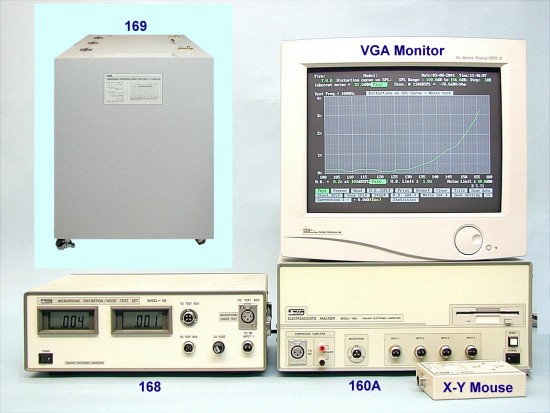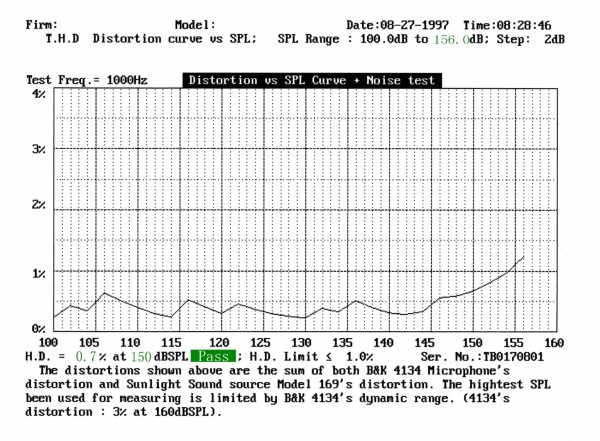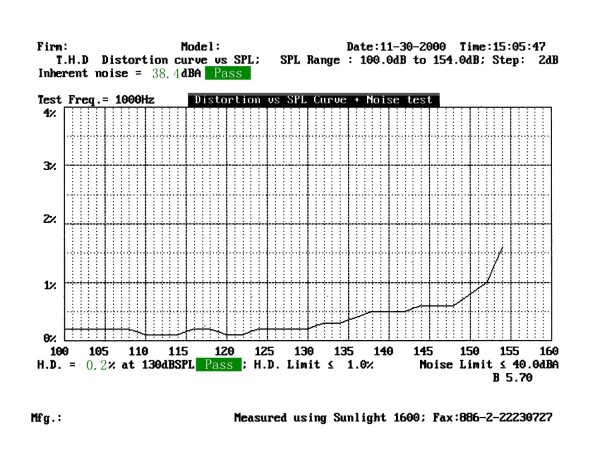
Type 1600MDN Microphone dynamic range Measuring System

Main Functions
TYPE 1600MDN can test the dynamic range of all kinds of microphones, which are: (1) Tests the distortion value and curve of the microphone at 100 ~ 160dBSPL; (2) Tests the inherent noise of the microphone.
Any type of microphones, including Electrets Condenser Microphone (ECM), Dynamic, Piezo, Ceramic and Carbon Microphones.
| Catalogue | Example of Testing Screen |
|
The fundamental combination of Type 1600 MDN |
|||
|
Item |
Model No. |
Description |
Usage |
|
1. |
160 A |
Electro acoustic Analyzer |
Mainframe. To control and process the input、output signal. |
|
2. |
Monitor & Keyboard |
High Resolution Color Display Monitor & Keyboard |
Display the tested results & data and key in data. User may buy these two items at his local market, since price is cheaper and can save freight charge and import tax. |
|
3. |
168 |
Microphone Distortion / Noise Test Set |
168+169
must combine with 160A to test the microphone: (1) High sound pressure distortion curve (100~160dB distortion
curve). (2) Inherent noise, can test as low as -5 dBA inherent noise of the microphone. |
|
4. |
169 |
Microphone Distortion / Noise Test Box |
|
|
5. |
X-Y Mouse |
Mouse |
Replace the upward, downward, leftward, rightward and enter keys on the keyboard. |
|
6. |
HP Printer ( Option ) |
Printer (All the HP DeskJet or HP Laser Printers that are supported by DOS can all be used.) |
Print out the tested results & data. |
Functions and Specifications of Type 1600 MDN
1600MDN is used for
testing the dynamic range of microphones. The dynamic range means one,
distortion and two, noise.
(1) Distortion : What is the upper sound level limit the microphone can receive on which the distortion of the output
electrical signal of the microphone is limited to a reasonable value? Usually this specification is expressed as the
input sound pressure level (SPL) while 3%, 5% or 10% output distortion is used as the “Reasonable value”. It is
true important that the sound source itself must generate much less distortion than the “Reasonable value” under
such
high sound level.
(2) Noise : The inherent noise of the microphone restricted the application of such microphone in low sound level. The
less the inherent noise and the better the S/N, which means the microphone may transfer clearly even in a very soft
and
low level speech.
Since
the manufacture of a high level - low distortion sound source is very difficult.
Also to read out the noise as lower as the level of μV
is very difficult, the measurement of the dynamic range of microphones is truly
difficult technically.
The
design of 1600MDN solves the above two difficulties masterly. It has the
following features :
A.
1600MDN can generate 100 to 160 dB SPL at 1 kHz
with very low distortion. Each 1600MDN is attached
with a distortion chart. This was measured by a B&K 4134 microphone which
was placed at the sound field generated by 169 sound source. The measured
distortion should be the amount of B&K 4134 and SUNLIGHT Sound Source 169.
The 1% distortion at 154 dB SPL means the distortion of Model 169 must be less
than 1%. (Please note that the specification of distortion of B&K 4134 at
160 dB SPL is less than 3%, It
is very difficult to keep the distortion as lower as 1% at 154 dB SPL, but the
SUNLIGHT Type 1600MDN can do it!
Specification
of the distortion of 1600MDN sound source Model 169 : ≦
1% (100 to 150 dB SPL; typ.<0.7%)
Start/stop
point of the high sound level scan : Can be set
between 100 to 160 dB. Please note that 160 dB can be set only when omni
directional microphones are measured. If unidirectional microphones are
measured, the 160 dB may not be reached (several dB less) due to the direction
pattern of the microphone.
Interval
of the high sound level scan : Can be set from1
dB/step to 10 dB/step.
B. The isolating of the box of Model 169 is as high as 58 dB A measured by pink noise. This means the inherent noise of
the microphone can be measured accurately in a quiet ordinary room (e.g. < 50 dB A). It is not necessary to be used
in
the anechoic chamber.
C. After putting the microphone into the box, the user needs only press a key, then both distortion curve and inherent
noise will be measured automatically, continuously and quickly. It is so fast that the measurement is suitable for use
in
production line.
D. Because the inherent noise of the microphone is very small (in the level of mV), it is very difficult to measure such
small voltage using ordinary instrument. The special design of 1600MDN solves the difficulty, and makes the measurement much quicker and easier.
Distortion curve of the combination of B&K 4134 and SUNLIGHT Sound Source 169 of 1600MDN :

One example of the measured distortion and inherent noise of a Kara OK microphone :

Products list | brand | Model No. | Home